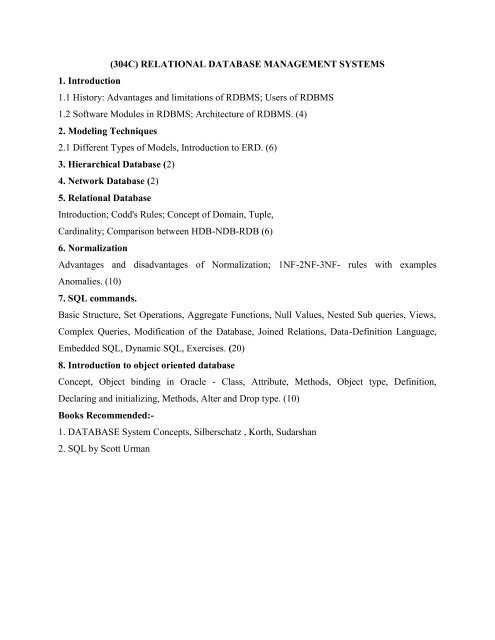MBA Semester III - K. K. Wagh Education Society
MBA Semester III - K. K. Wagh Education Society MBA Semester III - K. K. Wagh Education Society
(304C) RELATIONAL DATABASE MANAGEMENT SYSTEMS 1. Introduction 1.1 History: Advantages and limitations of RDBMS; Users of RDBMS 1.2 Software Modules in RDBMS; Architecture of RDBMS. (4) 2. Modeling Techniques 2.1 Different Types of Models, Introduction to ERD. (6) 3. Hierarchical Database (2) 4. Network Database (2) 5. Relational Database Introduction; Codd's Rules; Concept of Domain, Tuple, Cardinality; Comparison between HDB-NDB-RDB (6) 6. Normalization Advantages and disadvantages of Normalization; 1NF-2NF-3NF- rules with examples Anomalies. (10) 7. SQL commands. Basic Structure, Set Operations, Aggregate Functions, Null Values, Nested Sub queries, Views, Complex Queries, Modification of the Database, Joined Relations, Data-Definition Language, Embedded SQL, Dynamic SQL, Exercises. (20) 8. Introduction to object oriented database Concept, Object binding in Oracle - Class, Attribute, Methods, Object type, Definition, Declaring and initializing, Methods, Alter and Drop type. (10) Books Recommended:- 1. DATABASE System Concepts, Silberschatz , Korth, Sudarshan 2. SQL by Scott Urman
(305C) VISUAL BASIC AND ORACLE 1. Introduction to Visual Basic Event-driven Programming, Starting and Exiting VB, Understand VB Environment, Project Explorer, Properties Window, Toolbox, Form Layout Window, Property Pages, Getting Help, Saving Project, Printing Project, Running Applications. (3) 2. Adding Code and Events Code Window, Naming Conventions, Variables (all data types) - Byte, Boolean, Integer, Long (long integer), Single (single-precision floating point), Double (double precision floating point), Currency (scaled integer), Decimal, Date, Object, String (variable length), String (fixed -length), Variant (with numbers), Variant (with characters), User defined (using type), Scope (Globa l, Local, Static), Constants. (3) 3. Visual Basic Controls Label and Textbox Controls, Command Button Controls, Frame, Checkbox and Option Button Controls, List Box and Combo Box Controls, Drive List Box, Directory List Box and File List Box Controls, Formatting Controls, Control Arrays, Tab Order. (5) 4. Working with functions String Functions, Mathematical Functions, Date Functions, Data type Conversion Functions. (3) 5. Control Statement IF and IIF Statement, Select Case Statement, Do Statement, For Statement Exit Statement. (2) 6. Dialog Boxes Msgbox, Inputbox, Common Dialog Box (Microsoft Common Dialog Control 6.0) (2) 7. Menus Creating Menus, Adding Code to Menus, Toolbars, Other Common Controls (Microsoft Windows Common Controls 6.0, Microsoft Windows Common Controls- 3 6.0) (3) 8. Accessing data Reading and Writing Files, Data Form Wizard, Data Control, Data Grid Control, DBCombo Box and DB-List Box, SQL Queries in VB, Jet DAO ADO (with controls and code), Error Handling. (5) 9. Objects and Classes (Only Basic Definition) OLE Control, Programming with objects (Creating objects of a user defined class and using them on the form). (2)
- Page 1 and 2: MBA Semester III (301) BUSINESS POL
- Page 3 and 4: (302) MANAGEMENT CONTROL SYSTEMS 1.
- Page 5 and 6: 12. Hypothesis testing - Types of t
- Page 7 and 8: 3. Advertising Management - Rajeev
- Page 9 and 10: (306A) CONSUMER & ORGANIZATIONAL BU
- Page 11 and 12: (307A) SALES MANAGEMENT & PERSONAL
- Page 13 and 14: (303B)-ADVANCED FINANCIAL MANAGEMEN
- Page 15 and 16: (304B)- DIRECT TAXATION 1. Accessib
- Page 17 and 18: (305B) - ADVANCE FINANCIAL SERVICES
- Page 19 and 20: (307B)- SECURITY ANALYSIS & PORTFOL
- Page 21: Books Recommended:- 1. Analysis and
- Page 25 and 26: 8. Database Triggers Types of Trigg
- Page 27 and 28: ERP Ware: ERP Implementation Framew
- Page 29 and 30: 5.4 The Pointer operator 5.5 Applic
- Page 31 and 32: (303D)- INVENTORY MANAGEMENT & MATE
- Page 33 and 34: (304D)- MODELING TECHNIQUES AND IT
- Page 35 and 36: (305D)- SUPPLY CHAIN & LOGISTICS MA
- Page 37 and 38: (306 D)- WORLD CLASS MANUFACTURING
- Page 39 and 40: 7. Productivity Management - System
- Page 41 and 42: 1. Bare Acts 2. Industrial Law - P
- Page 43 and 44: 9 Human Developments -Diane E.Papal
- Page 45 and 46: (306E)- TRAINING & DEVELOPMENT 1. I
- Page 47 and 48: (303F)- INTERNATIONAL MARKETING 1)
- Page 49 and 50: 8. NETWORK DESIGN : [4] Decisions i
- Page 51 and 52: (306F) INTERNATIONAL REGULATORY ENV
- Page 53: 12 Transport till destination.
(304C) RELATIONAL DATABASE MANAGEMENT SYSTEMS<br />
1. Introduction<br />
1.1 History: Advantages and limitations of RDBMS; Users of RDBMS<br />
1.2 Software Modules in RDBMS; Architecture of RDBMS. (4)<br />
2. Modeling Techniques<br />
2.1 Different Types of Models, Introduction to ERD. (6)<br />
3. Hierarchical Database (2)<br />
4. Network Database (2)<br />
5. Relational Database<br />
Introduction; Codd's Rules; Concept of Domain, Tuple,<br />
Cardinality; Comparison between HDB-NDB-RDB (6)<br />
6. Normalization<br />
Advantages and disadvantages of Normalization; 1NF-2NF-3NF- rules with examples<br />
Anomalies. (10)<br />
7. SQL commands.<br />
Basic Structure, Set Operations, Aggregate Functions, Null Values, Nested Sub queries, Views,<br />
Complex Queries, Modification of the Database, Joined Relations, Data-Definition Language,<br />
Embedded SQL, Dynamic SQL, Exercises. (20)<br />
8. Introduction to object oriented database<br />
Concept, Object binding in Oracle - Class, Attribute, Methods, Object type, Definition,<br />
Declaring and initializing, Methods, Alter and Drop type. (10)<br />
Books Recommended:-<br />
1. DATABASE System Concepts, Silberschatz , Korth, Sudarshan<br />
2. SQL by Scott Urman



